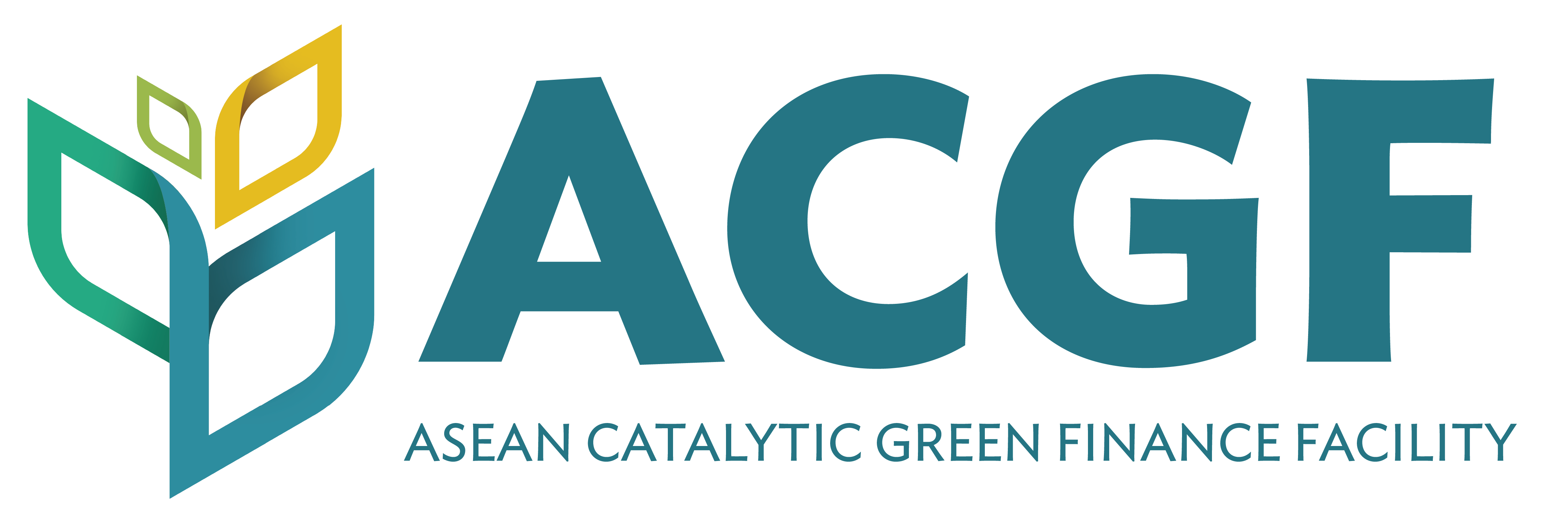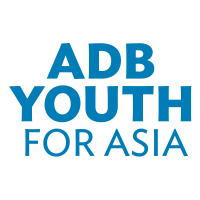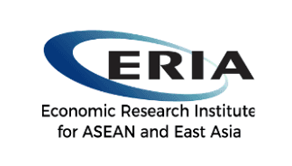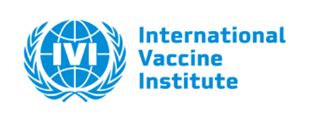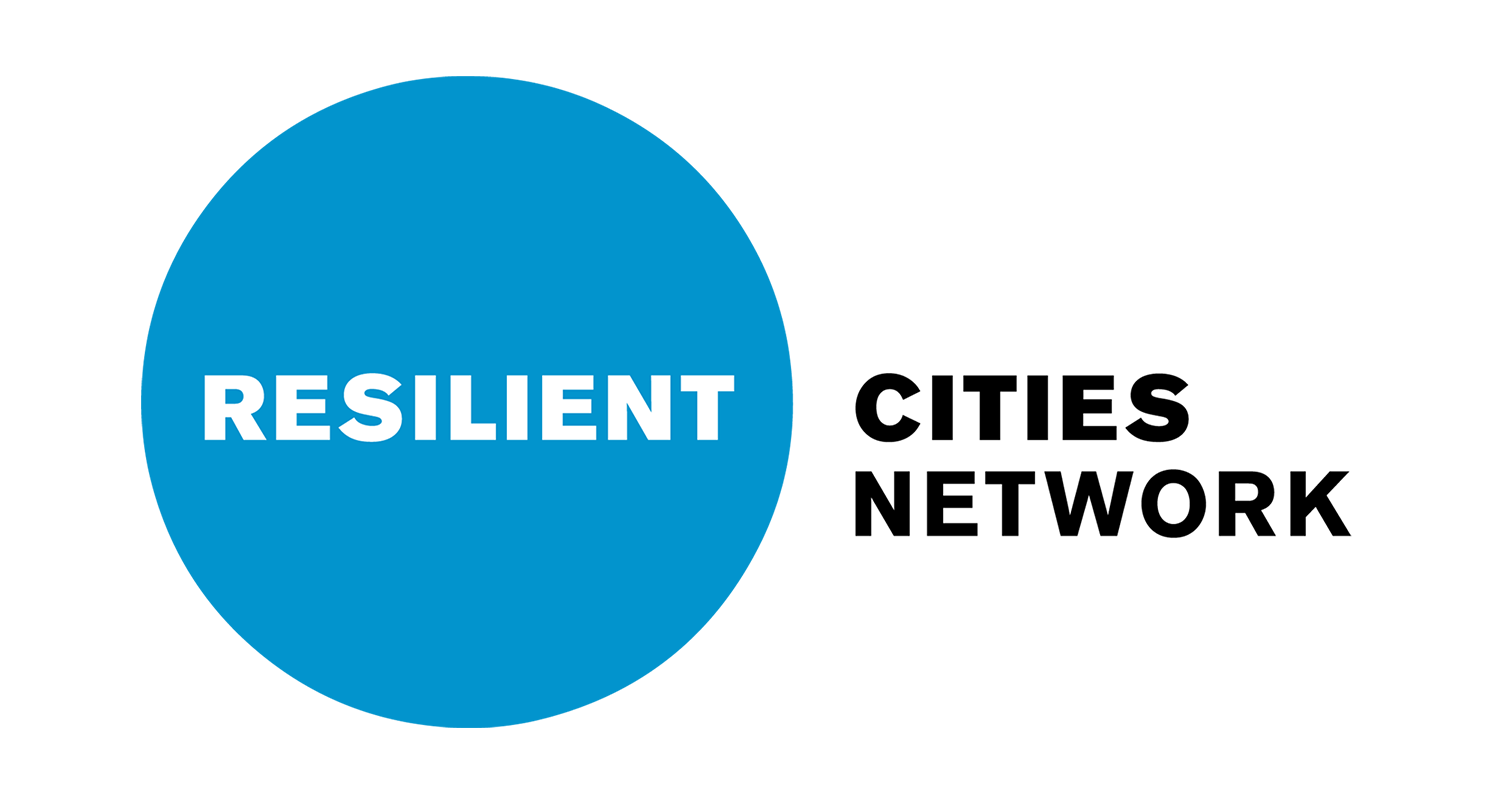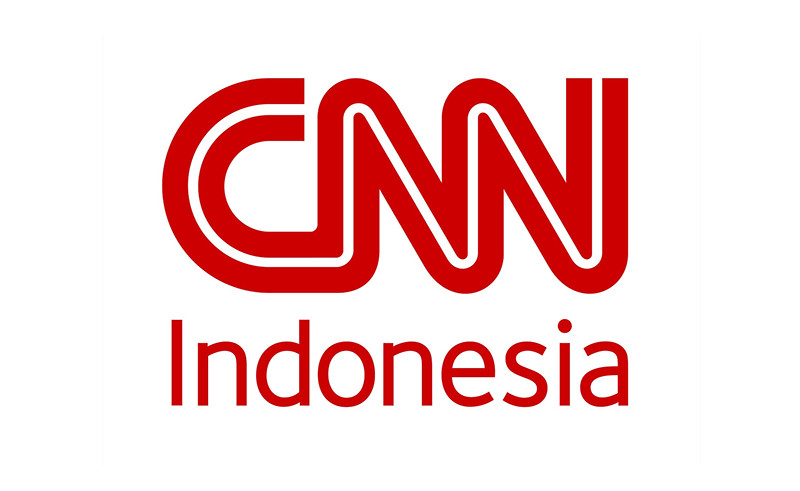The pandemic has had a deep and profound impact throughout Southeast Asia. While countries continue to grapple with the severe economic, health, and social impacts of the pandemic, vaccine rollouts, the promise of new treatments, substantial economic relief, and targeted social support are helping to make inroads.
Green shoots of recovery are starting to appear, and Southeast Asian nations are now laying the groundwork for reopening, and a more enduring recovery.
SEADS 2022, “Sustainable Solutions for Southeast Asia’s Recovery,” focused on innovative solutions to build back better and rebound from the COVID-19 crisis. It aimed to help countries find novel ways to address debilitating supply chain bottlenecks; rejuvenate the region’s once-flourishing tourism industry; and advance digital transformation.
SEADS 2022 also explored new opportunities that could take the region beyond business as usual by helping countries:
- Enhance domestic resource mobilization;
- Find green and environmentally sustainable pathways;
- Improve inclusivity for the poor and other vulnerable groups; and
- Promote equality and greater opportunities for women.
SEADS aims to help crystallize thinking on relevant and critical issues in the region, and support countries in becoming prosperous, knowledge-based, and sustainable.
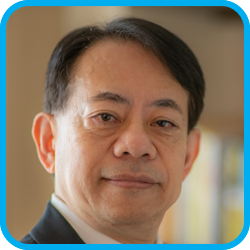
Masatsugu Asakawa is the President of the Asian Development Bank (ADB) and the Chairperson of ADB’s Board of Directors. He was elected President by ADB’s Board of Governors and assumed office on 17 January 2020.
Prior to joining ADB, he served as Special Advisor to Japan’s Prime Minister and Minister of Finance, and has a close-to-four decades’ career at the Ministry of Finance with diverse professional experiences that cut across both domestic and international fronts.
In the immediate aftermath of the Global Financial Crisis, Mr. Asakawa, in his capacity as Executive Assistant to Prime Minister Taro Aso, took part in the first G20 Leaders’ Summit Meeting in November 2008. He was instrumental in orchestrating a globally coordinated financial package to abate the financial crisis, including a $100 billion loan from Japan to the International Monetary Fund (IMF). Then in 2016, in his capacity as Vice Minister of Finance for International Affairs, he took on a leading role for the G7 Finance Ministers and Central Bank Governors meeting in Sendai under the Japanese presidency, where a sustainable and inclusive development agenda was extensively discussed.
Most recently, he served as Finance Deputy for the G20 meetings under the Japanese presidency, playing a pivotal role for the success of the G20 Osaka Summit as well as the G20 Finance Ministers and Central Bank Governors meeting in Fukuoka. Some of his outstanding achievements in Osaka include endorsement by the G20 Leaders of the “G20 Principles for Quality Infrastructure Investment” and the “G20 Shared Understanding on the Importance of UHC Financing in Developing Countries”. Before these, he had occupied various prominent positions within the Ministry of Finance, including director positions in charge of development policy issues, foreign exchange markets and international tax policy.
Mr. Asakawa’s professional experience extends beyond the realms of the Japanese government. Most notably, he served as Chief Advisor to ADB President Kimimasa Tarumizu between 1989 and 1992, during which time he spearheaded the creation of a new office that focuses on strategic planning. Also, he had frequent engagement with the Organisation for Economic Co-operation and Development in such positions as Chair for Committee on Fiscal Affairs (2011-2016).
Furthermore, he was a senior staff at the Fiscal Affairs Department of the IMF (1996-2000). In the meantime, he gave lectures as Visiting Professor at the Graduate School of Economic Science, Saitama University (2006-2009), and at the Graduate School of Arts and Sciences, University of Tokyo (2012-2015).
Mr. Asakawa obtained his BA from University of Tokyo (Economics Faculty) in 1981, and MPA from Princeton University, USA, in 1985.
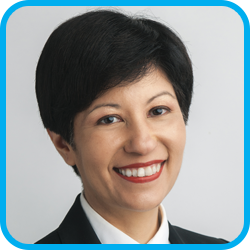
Indranee Thurai Rajah is a Minister in the Prime Minister’s Office of Singapore. She is also Second Minister for Finance and and Second Minister for National Development, as well as a Leader of the House for the 14th Parliament. She has been a Member of Parliament for the Tanjong Pagar Group Representation Constituency since 2001.
She was a practicing lawyer and a Senior Counsel before joining the government.
Under her law portfolio from 2012 to 2018, she co-chaired the Committees on Family Justice, the formation of the Singapore International Commercial Court, as well as the Committee to Strengthen Singapore as an International Centre for Debt Restructuring. She also co-chaired the Penal Code Review Committee whose recommendations led to major amendments of the Penal Code, including greater protection for women and the vulnerable.
In her first tour of the Education Ministry from 2012 to 2015, she led the Applied Study in Polytechnics and ITE Review (ASPIRE) Committee resulting in the setup of SkillsFuture, a national movement to align education with economic demand, career guidance, and lifelong learning. In her second stint from 2018 to 2020, Ms. Rajah chaired UPLIFT—“Uplifting Pupils in Life and Inspiring Families Taskforce"—an inter-agency team convened in 2018 to strengthen support for students from disadvantaged families.
Under her finance portfolio, Ms. Rajah co-chaired the Working Group on Legal and Accounting Services, a sub-committee of the 2016 Committee on the Future Economy, the recommendations of which are aimed at transforming the legal and accounting industries in Singapore and catalyzing the internationalization of such professional services. She oversees Infrastructure Asia, the Singapore government platform that connects infrastructure demand and supply in the region.
In the Prime Minister’s Office, Ms. Rajah oversees the National Population and Talent Division and assists Senior Minister Teo Chee Hean on population matters.
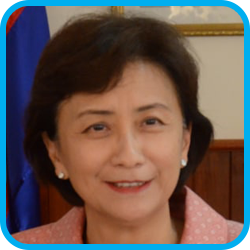
Since 2004, Ing Kantha Phavi has been serving as the Minister of Women’s Affairs, where she is responsible for its management and leadership. In addition to her ministerial post, she has been the Chairwoman of the Cambodian National Council for Women since 2004. Prior to becoming Minister, Dr. Phavi served for 5 years as Secretary of State of Women’s and Veterans’ Affairs.
Under her leadership, the Ministry of Women’s Affairs has succeeded in integrating gender equality measures into important laws such as the Land Law, the Decentralization and Deconcentration Organic Laws, and laws related to combating violence against women, such as the Anti-Trafficking of Human Beings and Sexual Exploitation Law, and the Law on Domestic Violence and Protection of the Victim. She continues to advocate for gender issues in state reforms and promote women’s economic empowerment and decision-making roles.
In the region and worldwide, Minister Phavi has contributed to the advancement of women’s agenda, especially at the East Asia Gender Equality Ministerial Meetings, the East Asia Ministerial Forums on Families and the ASEAN Ministerial Meetings on Women. In 2014, Minister Phavi was one of the nine women leaders awarded by the Asia Pacific Economic Cooperation (APEC) Women Leadership Forum as “Most Outstanding Women”.
In the 1990s, Dr. Phavi worked in France as a private medical doctor and, later on, as director of the drugs trials department at ABR, a French firm involved in marketing and research for medical drugs.
Dr. Phavi also served as Deputy Secretary General in the medical nongovernment organization, Association des Medecins Cambodgiens, which provides medical and social assistance to Cambodia. Dr. Phavi holds a medical doctorate with a specialization in nutrition and tropical diseases from Saint Antoine Faculty, Paris and a brevet in Public Administration from Ecole Nationale d’Administration, Paris. In 2004, she participated in the Executive Leadership Program, Leaders in Development: Managing Political and Economic Reforms, at Harvard University’s John F. Kennedy School of Government.
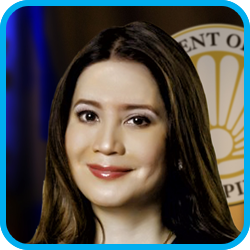
Bernadette Fatima T. Romulo-Puyat is the Secretary of the Department of Tourism after being appointed by President Rodrigo Duterte in 2018. She attended the University of the Philippines and pursued an undergraduate and a master's degree in economics.
Secretary Romulo-Puyat was a former lecturer at the UP School of Economics (1994-2006). She also served as an economic consultant at the Housing and Urban Development Coordination Council (HUDCC) (2001-2002) and the Presidential Management Staff (2005-2006), and was Deputy Cabinet Secretary at the Office of the President in 2006.
She was appointed as Undersecretary at the Department of Agriculture from 2007 to 2018 where she was designated to handle Special Concerns, Administration and Finance, and Agribusiness and Marketing.
Secretary Romulo-Puyat assumed office as the Secretary of the Department of Tourism on 14 May 2018.
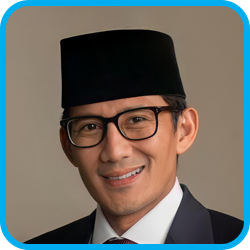
Sandiaga Salahuddin Uno is an Indonesian businessman. He was appointed as Indonesia’s Minister of Tourism and Creative Economy on 23 December 2020.
Sandiaga has passion for empowering young entrepreneurs, supporting small-and-medium enterprises (SMEs), and enhancing access to finance in Indonesia. He has been active as a social entrepreneur since 2005 and serves as chairman in several well-known associations and foundations in Indonesia. He founded a social movement in job creation through training and mentoring in entrepreneurship. To this day, he continues to focus on increasing job creation especially in SMEs.
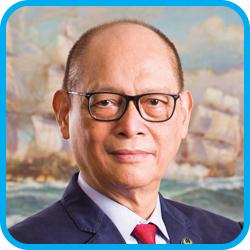
Benjamin E. Diokno is the current Governor of the Bangko Sentral ng Pilipinas (BSP). Prior to his appointment, he served as Budget Secretary from 2016 to 2019, marking his third tour of duty at the Department of Budget and Management. As Budget Secretary, he pursued an expansionary fiscal policy to finance investments in human capital development and public infrastructure.
Under his leadership, the BSP was among the first central banks in the world to respond to the COVID-19 crisis. The prompt and extraordinary monetary measures provided a significant cushion to the current state of the Philippine economy. As such, international publication The Banker named him “Global Central Bank Governor of the Year 2022,” a first for the Philippines.
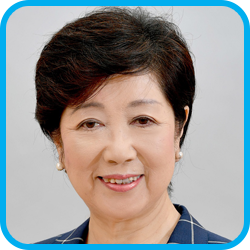
Born: July 15, 1952, in Hyogo Prefecture
Education: BA in Sociology, Cairo University (October 1976)
Career:
July 2020 - Re-elected to a second term as Governor of Tokyo
July 2016 - Elected Governor of Tokyo
October 2011 - Director, Committee on Budget, House of Representatives
September 2010 - Chairperson, General Council, Liberal Democratic Party
July 2007 - Minister of Defense
September 2006 - Special Advisor to the Prime Minister for National Security Affairs
September 2004 - Minister of the Environment and Minister of State for Okinawa and Northern Territories Affairs
September 2003 - Minister of the Environment
July 1993 - Member of the House of Representatives
July 1992 - Member of the House of Councillors
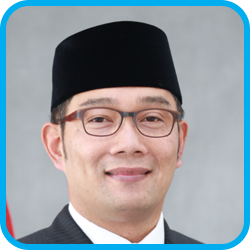
Mochamad Ridwan Kamil, ST. MUD (Born in Bandung, October 4th, 1971); is a Mayor of Bandung for 2013-2018. His background is an architect, lecturer, and social activist. He graduated from Architecture Engineering of Bandung Institute of Technology (ITB) and achieved Master Degree from University of California, Berkeley. After finishing his master program, he began his professional career in several firms in The United States of America and has built more than fifty (50) projects of architecture and urban design in America, Middle East and Asia. Through his own firm, he has nationally and internationally won more than 20 competitions and awards.
Education
▪ Banjarsari III Elementary School, Bandung 1978-1984
▪ Junior High School 2 of Bandung 1984-1987
▪ Senior High School 3 of Bandung 1987-1990
▪ Architecture Engineering of Bandung Institute of Technology 1990-1995
▪ Master of Urban Design, University of California, Berkeley 1999-2001
Awards
1. Diaspora Award 2015, public service award of excellence.
2. PAN Award 2015, the most contributing person in initiating the shifting implementing.
3. The 3rd on IKCI Award (Index of Indonesia Smart City) 2015 from Kompas.
4. Award from Foreign Policy Community of Indonesia (FPCI) Annual Conference 2015, in reaching the innovative leadership thus makes Bandung well-known internationally.
5. Indonesia’s Attractiveness Award 2015 from Tempo, in field of city infrastructure, local tourism and the complete categories best city.
6. Marketer of The Year Award in government sector 2015.
7. Indonesia Digital Society Award 2015, The Most Digital City in society monitoring by Bandung Command Center.
8. Government Award from Sindo Weekly 2015, in environment awareness.
9. Obsession Award 2015 as Best IT Innovation Mayor
10. The highest level of gratification report and on time Local Government 2014, from Corruption Eradication Commission.
11. The Best Local Government in Gratification Managerial Unit 2014 from Corruption Eradication Commission.
12. Wahana Tata Nugraha Award 2014 from Transportation Minister for traffic and transportation categories.
13. Sindo Trijaya Award 2014, The Most Innovative Mayor.
14. Adiupaya Puritama Award from The Ministry of Public Housing for Metropolitan City Category.
15. The Most Loyal on Public Service Standard from Ombudsman.
16. Demokrasi Award from Rakyat Merdeka.
17. Government Award from Sindo Weekly, 2014 in infrastructure category.
18. Urban Leadership Award from Pensylvania University, AS
19. Pikiran Rakyat Award 2012 for The Most Creative Youth.
20. International Winner as Young Design Entrepreneur of the Year from British Council Indonesia.
21. Indonesia Green Awards (Inspiring Earth Award), as an initiator for Indonesia Berkebun (Gardening Indonesia).
22. Gatra Ikon 2012.
23. Green Leadership Award for Al-Irsyad Mosque from BCI Asia.
24. Top 5, Best Building of The Year 2010 from ArchDaily for Al-Irsyad Mosque.
25. BCI Asia Top Ten Architecture Business Award Architect of the Year from Elle D cor Magazine.
Award and Achievement as The Governor of West Java:
1. The Achievement of 5 times Unqualified Opinion for Monetary Report from 2013-2017 (Accepted by Vice Governor of West Java in Dhanapala Building, Finance Ministry on September 20, 2018).
2. Architect Indonesia Award. The award had given by Home Affairs Minister in Preanger Hotel, Bandung on September 22, 2018.
3. Indonesia Attractiveness Award 2018 for West Java Government as the best infrastructure province (Given by Home Affairs Minister on September 14, 2018 in JW Marriot Jakarta.
4. The Achievement of The Best of finalizing TLHP. The award was given by Home Affairs Minister to Vice Governor in Grage Hotel Bengkulu on Monday, October 8, 2018.
5. Anugerah Kihajar 2018. The award was accepted by the Regional Secretary of West Java Province in Sultan Hotel Jakarta, on Friday, October 12, 2018.
6. The Best Coaching Mayor in the innovator of Appropriate Technology on XX National Appropriate Technology Event in Bali on October 18, 2018.
7. The second winner in Innovated Exhibition Boot on Village and Sub-District Innovating Weekend 2018 in Jakarta on October 21, 2018

Zairil Khir Johari is the State Executive Councillor for Infrastructure and Transport in the Penang State Government. He is also the State Assemblyman for Tanjong Bunga, a seat he won in the 14th General Election in 2018.
From 2013 to 2018, Zairil was the Member of Parliament for Bukit Bendera, during which he was also the Democratic Action Party’s (DAP) Parliamentary Spokesperson for Education, Science and Technology.
From 2012 to 2016, Zairil headed the Penang Institute, a state-funded public policy think tank based in Penang. Under his leadership, the Penang Institute convened numerous international conferences and lectures, besides publishing the Penang Paradigm, a development blueprint for the state of Penang. He now continues to serve as a Senior Fellow of the institute.
In 2014, Zairil was selected as a global “Leader of Tomorrow” for the 44th St Gallen Symposium in Switzerland, an annual conference aimed at fostering inter-generational and inter-cultural dialogue between the decision-makers of today and tomorrow. In 2017, Zairil was chosen to participate in the prestigious UK Foreign and Commonwealth Office’s International Leaders Programme, an initiative that connects future leaders from emerging power countries. In the same year, he was also invited to attend the Young Political Leaders Programme by the Australian Department of Foreign Affairs and Trade, as well as the Leaders in Governance Programme, which is the Singapore Civil Service College’s flagship course for senior public servants.
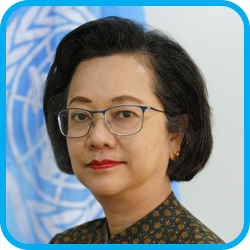
Armida Salsiah Alisjahbana, Executive Secretary of the United Nations Economic and Social Commission for Asia and the Pacific took office on 1 November 2018. Ms. Alisjahbana was Professor of Economics at Universitas Padjadjaran and was Minister of National Development Planning and the Head of the National Development Planning Agency (BAPPENAS), Indonesia from 2009 to 2014. In 2016, Ms. Alisjahbana was a member of the High-Level Independent Team of Advisors to support the ECOSOC Dialogue on the longer-term positioning of the United Nations for the 2030 Agenda. Ms. Alisjahbana obtained her PhD in Economics from the University of Washington, US.
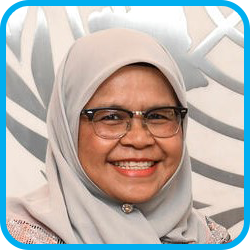
Maimunah Mohd Sharif of Malaysia is the Executive Director of the United Nations Human Settlements Programme (UN-Habitat), appointed at the level of Under-Secretary-General, following an election by the General Assembly on 22 December 2017. Ms. Sharif assumed her post at UN-Habitat's Headquarters in Nairobi, Kenya in January 2018. In 2022, the General Assembly, following the recommendations of the United Nations Secretary-General, confirmed Ms. Maimunah Mohd Sharif as Executive Director of UN-Habitat for a further 2 years.
Since joining the United Nations, Ms. Sharif has re-positioned UN-Habitat as a thought leader in sustainable urbanization and an agency that advocates for the implementation of the New Urban Agenda to achieve the Sustainable Development Goals and the nationally determined contributions to the Climate Action Paris Agreement. She is the Co-Chair of the Secretary-General’s Task Force on the Future of Cities and Co-Chair of the Local 2030 Coalition, designed to support and accelerate local-led delivery of the Sustainable Development Goals. Ms. Sharif is an advocate for local voluntary reviews of the New Urban Agenda and a champion of urban issues in the World Economic Forum. In June 2022, she will open the Eleventh Session of the World Urban Forum in Katowice, Poland.
Before becoming Executive Director, Ms. Sharif served as Mayor of Penang in Malaysia and was the President of the Malaysian Association of Local Authorities (MALA). She has over 30 years of experience in urban planning, urban regeneration and community-led development.
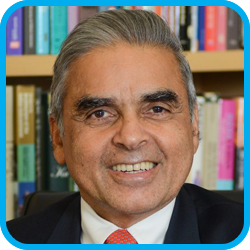
Kishore Mahbubani has been privileged to enjoy two distinct careers, in diplomacy (1971 to 2004) and in academia (2004 to 2019). He is a prolific writer who has spoken in many corners of the world.
In diplomacy, he was with the Singapore Foreign Service for 33 years (1971 to 2004). He had postings in Cambodia, Malaysia, Washington DC, and New York, where he twice was Singapore’s Ambassador to the UN and served as President of the UN Security Council in January 2001 and May 2002. He was Permanent Secretary at the Foreign Ministry from 1993 to 1998. As a result of his excellent performance in his diplomatic career, he was conferred the Public Administration Medal (Gold) by the Singapore Government in 1998.
Mr. Mahbubani joined academia in 2004, when he was appointed the Founding Dean of the Lee Kuan Yew School of Public Policy (LKY School), NUS. He was dean from 2004 to 2017, and a professor in the Practice of Public Policy from 2006 to 2019. In April 2019, he was elected as an honorary international member to the American Academy of Arts and Sciences, which has honored distinguished thinkers, including several of America’s founding fathers, since 1780.
Mr. Mahbubani was awarded the President’s Scholarship in 1967. He graduated with a First Class Honours degree in Philosophy from the University of Singapore in 1971. From Dalhousie University, Canada, he received a master’s degree in philosophy in 1976, and an honorary doctorate in 1995. He spent a year as a fellow at the Center for International Affairs at Harvard University from 1991 to 1992.
He has achieved several “firsts” in his two careers. He was the founding dean of the LKY School, the founding director of the Civil Service College, the first Singapore Ambassador to serve on the UN Security Council, the first Singaporean to publish articles in globally renowned journals and newspapers like Foreign Affairs, Foreign Policy, the New York Times, and the Financial Times and co-authored articles with distinguished global thought leaders like Kofi Annan, Klaus Schwab, and Larry Summers. Mr. Mahbubani has never shied away from taking on new challenges.
He has also been a prolific author, having published eight books: Can Asians Think?, Beyond The Age Of Innocence, The New Asian Hemisphere, The Great Convergence, Can Singapore Survive, The ASEAN Miracle (co-authored with Jeffery Sng), Has the West Lost It? and Has China Won?.
Mr. Mahbubani has received significant international recognition for his many accomplishments. The Foreign Policy Association Medal was awarded to him in New York in June 2004 with the following opening words in the citation: “A gifted diplomat, a student of history and philosophy, a provocative writer and an intuitive thinker”. He was listed as one of the top 100 public intellectuals in the world by Foreign Policy and Prospect magazines in September 2005, and included in the March 2009 Financial Times list of Top 50 individuals who would shape the debate on the future of capitalism. He was selected as one of Foreign Policy’s Top Global Thinkers in 2010 and 2011. In 2011, he was described as “the muse of the Asian century”. He was selected by Prospect magazine as one of the top 50 world thinkers for 2014.
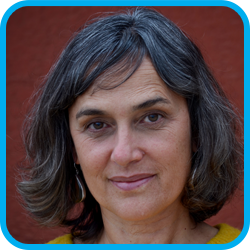
A leader in international development and humanitarian response, Sofía brings over 25 years of experience of working at CARE. She spearheaded CARE’s first program strategy and was integral to placing gender equality at the very heart of CARE’s worldwide work. In CARE’s 75-year history, her leadership remains pivotal to the development of CARE's 2030 Vision in contribution to Sustainable Development Goals.
Sofía, originally from Uruguay, lives in Quito, Ecuador. First joining CARE in 1994, she has served in several positions, providing support to programs in Asia, Africa, the Middle East, and Latin America. With extensive experience in program design and implementation, impact measurement and evaluation, and advocacy, Sofia remains dedicated to transforming power relations inside and outside of the organization. Her unshakable commitment to gender equality is drawn from many years of working alongside some of the world’s most marginalized women—from domestic workers to women working in the garment sector, and victims of gender-based violence.
Prior to working in international development, Sofía worked in the field of public opinion polls and audience research. She holds a BA in Sociology from the Universidad de la República Oriental del Uruguay and an MSc in Epidemiology from the University of London/London School of Hygiene and Tropical Medicine.
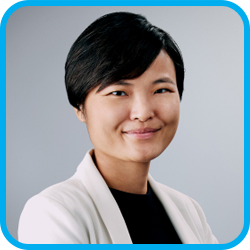
Hooi Ling Tan is the cofounder of Grab, Southeast Asia's leading "superapp" that offers a wide range of on-demand services, including mobility, food, package and grocery delivery services, mobile payments, and financial services to millions of Southeast Asians.
Based in Singapore, she oversees critical pillars of Grab’s operations, including corporate strategy, technology (product, design, engineering, data science and analytics), user experience, and people operations.
Prior to joining Grab full-time in 2015, Hooi Ling led high priority strategic and operational projects at Salesforce, working at the company’s San Francisco headquarters. There, she specialized in corporate strategy, corporate operations, pricing intelligence, and monetization. Before joining Salesforce, Hooi Ling was a consultant at McKinsey & Company, advising global corporations in Southeast Asia, North America, Latin America, and Australia on corporate strategy and operations.
Hooi Ling is a member of the National University of Singapore Board of Trustees, and sits on the board of the Economic Development Board, and Wise (formerly TransferWise).
Hooi Ling has a BA in Engineering (Mechanical) from the University of Bath, and an MBA from Harvard Business School.

Kate Brandt leads sustainability across Google’s worldwide operations, products, and supply chains. In this role, Kate partners with Google’s data centers, real estate, supply chain, and product teams to ensure the company is capitalizing on opportunities to strategically advance sustainability.
Previously, Kate served as the United States’ first Federal Chief Sustainability Officer. In this capacity, she was responsible for promoting sustainability across Federal Government operations, including 360,000 buildings, 650,000 vehicles, and $445 billion annually in purchased goods and services. Prior to the White House, Kate held several senior roles in the US Federal Government including senior advisor at the Department of Energy, director for Energy and Environment in the White House Office of Presidential Personnel, and energy advisor to the Secretary of the Navy.
Kate is the recipient of the Distinguished Public Service Award, the highest award the US Navy can give to a civilian, for her work helping the Navy go green. Outside Magazine also named her, in honor of the publication’s 40-year anniversary, as one of 40 women who has made the biggest impact on our world.
Kate serves on the boards of EVgo, Business for Social Responsibility, the Institute at Brown for Environment and Society, and the Corporate Eco Forum.
Kate received a master’s degree in International Relations from the University of Cambridge where she was a Gates Cambridge Scholar. She graduated with honors from Brown University.

Ahmed M. Saeed joined ADB in 2019 and has significant prior leadership experience in both government and the private sector. He is currently responsible for overseeing ADB’s operations in East Asia, Southeast Asia, and the Pacific.
Between 2004 and 2008, Mr. Saeed served in senior roles at the US Treasury. He was an advisor to the Secretary of the Treasury (2004-05) and the Deputy Assistant Secretary of the Treasury for the Middle East and Africa, with responsibility for US economic diplomacy and financial engagement across 68 countries (2005-08). He has worked closely with two Secretaries of the Treasury (John Snow and Hank Paulson). He was deeply involved in a number of significant debt relief exercises (for Liberia, Lebanon, Jordan, and Iraq) and laid the basis for what became the Santiago Principles for sovereign wealth funds.
Prior to joining ADB, Mr. Saeed spent close to 8 years as Managing Director and head of JPMorgan’s coverage for finance ministries, central banks, and sovereign wealth funds across the Middle East and North Africa. He has raised over $100 billion in financing for governments, including the debut sovereign bond issuances for several sovereigns and the largest ever sovereign bond offerings in emerging markets (twice).
Mr. Saeed began his career as a lawyer at White & Case. In the late 1990’s, he led technology-related businesses in the UK, US, and Japan, raising over $150 million for companies in which he was a key principal.
Mr. Saeed holds a Doctor of Jurisprudence from the University of Chicago Law School and a Master of Business Administration in Finance from the University of Chicago Graduate School of Business, as well as a BA (Economics and Political Science) from McGill University. He is a former White House Fellow and a life member of the Council on Foreign Relations.
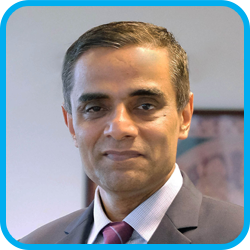
Ramesh Subramaniam has been with the Asian Development Bank (ADB) for over 24 years, since March 1997. He has worked in different functions and areas in over 25 countries across the various sub-regions of Asia and the Pacific. In his current capacity as Director General of the Southeast Asia Department (SERD) from July 2017, he is in charge of ADB’s relationship with the 10 countries in the Association of Southeast Asian Nations (ASEAN) and Timor-Leste, as well as all of its Sovereign engagement. He has been a member of various Global Agenda/Future Councils of the World Economic Forum (WEF) since 2012, and currently serves as the co-chair of the ASEAN Hub of WEF’s Sustainable Development Investment Partnership.
With a talent pool of over 430 globally and locally recruited staff, SERD has over $24 billion in projects under implementation. In addition, SERD also has several ongoing policy and structural reform programs with at least over $12 billion in funds disbursed and under monitoring. ADB’s new Sovereign commitments in Southeast Asia stand at around $7 billion per year in transport, energy, urban, agriculture and natural resources, human development, finance, and public management sectors, besides regional cooperation and integration.
From February 2020, Ramesh has been steering ADB’s work in the sub-region to help countries in their COVID-19 response. ADB mobilized over $5.3 billion in exceptional financing for economic and health sector measures in Southeast Asia. ADB also provided an emergency food grant for close to a million individuals in Metro Manila who had lost their jobs due to the pandemic, for which it also leveraged private sector financing. At present, teams are working under his overall leadership to mobilize vaccine support. The first-ever vaccine financing project of ADB under the $9-billion APVAX regional facility was recently approved for the Philippines ($400 million), followed by Indonesia ($450 million), to be followed by assistance to Cambodia in the fourth quarter.
Ramesh has also served as ADB’s Director General of Procurement, Portfolio and Financial Management Department (2015-2017); Deputy Director General of SERD (2013-2015); Senior Director in the Office of Regional Economic Integration (2011-2013); Director of public management and financial sector (2007-2010) as well as Director of urban infrastructure (2010-2011) in Central and West Asia; and Principal Economist and Deputy Country Director in Indonesia (2003-2007).
With a strong focus on policy and institutional reforms across the region, Ramesh’s strong interest has been in helping the region’s developing member countries reduce poverty, achieve equitable growth, and attract greater private sector investments. He has led several important initiatives such as the establishment of the ASEAN Infrastructure Fund, various critical post-crisis counter-cyclical reform and restructuring programs in many countries, as well as post-disaster reconstruction projects across the Asia and the Pacific. The ASEAN Policy Network and ASEAN Innovation Hub were established under his leadership in 2017, and he oversaw the establishment of the ASEAN Catalytic Green Finance Facility. Among other aspects of his work, Ramesh is most humbled by his role in formulating ADB’s support after several devastating natural disasters, including the December 2004 Indian Ocean Tsunami; 2006 Yogyakarta earthquake; 2006 Pakistan earthquake; 2009 Pakistan floods; 2013 Typhoon Haiyan in the Philippines; 2018 Palu earthquake and tsunami in Indonesia; and most recently the 2020 COVID-19 pandemic.
In parallel, Ramesh has maintained strong interest in education as an instrument for change. Improving social service delivery has been a key part of his support for public sector reforms in many countries. He considers serving the needy through the development profession as a highly noble endeavor. Outside of ADB, he is involved in volunteering work focused on livelihood, health care, and education, with the aim of promoting the fundamental human values of Love, Truth, Peace, Right Conduct, and Non-violence in society overall.
Ramesh has an MA in Economics from University of Madras, India (1988); and a Ph.D. in Economics from McMaster University, Canada, where he was also a Lecturer (1990-1993). He has been a Research Fellow on Industry at University of St. Andrews in United Kingdom from December 1993 to January 1994, and Rockefeller Fellow at Yale University Economic Growth Center from February 1994 to March 1997.
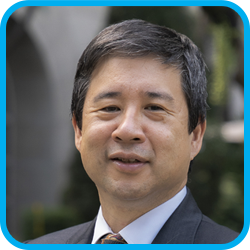
Albert F. Park is chief economist of the Asian Development Bank (ADB) and director general of its Economic Research and Regional Cooperation Department. He is chief spokesperson on economic and development trends and leads the production of ADB’s flagship knowledge products and support for regional cooperation fora.
Mr. Park has more than 2 decades of experience as a development economist. A well-known expert on the economy of the People’s Republic of China, he has directed a number of large-scale research projects in the country. He has also served as an international consultant for the World Bank and a member of the steering committee for the Asia-Pacific Research Universities’ Population Ageing Hub. Mr. Park has worked on a broad range of development issues including poverty and inequality, intergenerational mobility, microfinance, migration and labor markets, the future of work, and foreign investment.
Mr. Park is chair professor of economics and director of the Center for Economic Policy at HKUST (on leave). Previously, he served as a founding director of HKUST’s Institute for Emerging Market Studies, professor at the University of Oxford, and associate professor at the University of Michigan. He has also held editorial positions at a number of leading economic journals.
A national of the United States, he received his bachelor’s degree in economics from Harvard University and his doctorate in applied economics from Stanford University.
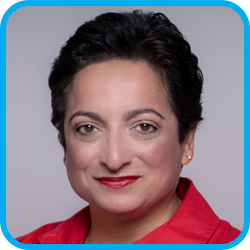
For more than 20 years, Shamina Singh has been on the frontlines of developing and implementing solutions to make the global economy work for everyone, everywhere.
Shamina is the founder and president of the Center for Inclusive Growth, the philanthropic hub of Mastercard. She also serves as executive vice-president of Corporate Sustainability.
Since 2014, she has led the Center with a remit to leverage Mastercard’s data, technology, capital, and expertise for social impact. In her role as EVP for Sustainability, she is responsible for the development and implementation of the environmental, social, and governance strategy across the company.
In 2018, Mastercard pledged $500 million to advance inclusive growth around the world. Shamina was named president of the Mastercard Impact Fund and charged with activating those philanthropic dollars to advance inclusive growth and financial inclusion around the world.
Currently, Shamina sits on the boards of Data & Society and ADL, a leading anti-hate organization. In addition, she serves as a board member of the Ann Richards School for Young Women Leaders and the Beeck Center for Social Impact and Innovation at Georgetown University. Shamina co-chairs the Ad Council’s Advisory Committee on Public Issues and serves on the Advisory Boards of social enterprise Women Reignite and The Aspen Institute Civil Society Fellowship. She is also a Henry Crown Fellow with The Aspen Institute.
Deeply committed to public service, Shamina has held senior positions in the White House and the US House of Representatives. In 2015, Shamina was appointed by President Obama and confirmed by the US Senate to a 6-year term on the board of the Corporation for National and Community Service. She is a graduate of the Presidential Leadership Fellows program and an alum of the Young Global Leaders program of the World Economic Forum.

Andrea Della Mattea is responsible for leading Microsoft’s overall business in Asia Pacific, accelerating the digital transformation journeys of our customers and partners and driving the company’s mission of empowering every person and every organization on the planet to achieve more.
She has more than 25 years of experience in the technology sector. Before joining Microsoft in 2017, she served in a series of senior leadership roles at Insight Enterprises & Software Spectrum in North America and APAC, including her most recent role as Asia Pacific Managing Director where she was responsible for the strategic and operational leadership across the region.
Della Mattea is passionate about helping customers and partners leverage technology to drive business outcomes and believes that when we are inclusive, everyone wins.
A distinguished alumna of James Cook University, Della Mattea received her Class 1 Honors Degree in Engineering and advocates a culture of learning. She is committed to encouraging women and girls to take up STEM education and build careers as entrepreneurs and developers.
Della Mattea is also a Graduate Member of the Australian Institute of Company Directors and currently serves on the Board of Directors for Meals on Wheels in New South Wales, Australia, and is on the Advisory Board for James Cook University. She resides in Singapore with her husband and two teenage sons.

As Deputy Director General, Winfried F. Wicklein supports the planning and delivery of Asian Development Bank’s (ADB) goals, strategies and work plan in Southeast Asia. This involves ADB’s relationships and public sector work (including technical assistance, knowledge products, and grant and loan projects) in ASEAN. It also includes ADB’s support for all sub-regional cooperation initiatives in the region.
With ADB for over 20 years, Mr. Wicklein has wide-ranging experience in the areas of infrastructure finance, private sector development, and country strategy and program coordination across Asia and the Pacific. Prior assignments included country director to Indonesia and Myanmar, as well as country postings in Australia, the Philippines, and Thailand.
Prior to joining ADB, Mr. Wicklein worked for PricewaterhouseCoopers advising on corporate mergers and acquisitions and, prior to that, for the United Nations Industrial Development Organization focusing on investment promotion and technology transfer.
A national of Austria, Mr. Wicklein holds a Master’s degree in business administration from the University of Muenster, Germany.
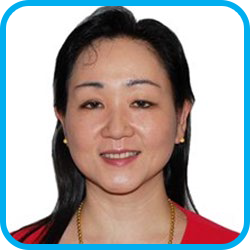
F. Cleo Kawawaki is the head of the Office of Public–Private Partnership (OPPP) of the Asian Development Bank (ADB). She assumed office in January 2022. The OPPP was established to enhance the role of ADB in supporting and enabling governments of its developing members to secure greater private investment and generate economic growth in the region. OPPP provides transaction advisory services to developing member clients in order to develop bankable PPP projects. It also coordinates and supports PPP-related activities in ADB.
Previously, she was in the deputy director general role for Southeast Asia and Central West Asia Regional Departments. SERD covers the ASEAN countries and Timore-Leste with a portfolio of over $20 billion in loans/grant assistance and CWRD covers Pakistan, Afghanistan, Central Asia, and the Caucus countries. From large road and infrastructure projects to education and rural development projects, ADB has been a partner to developing member countries for over 55 years. ADB is working with our countries for immediate support for medical, social, and economic needs as well as formulating innovative green recovery. She also chairs the Digital Committee for ADB.
Prior to this position, Ms. Kawawaki was the director, Energy Division of the Central and West Asia Department. Responsible for business development and implementation of a $7-billion portfolio for the Central and West Asian countries as well as leading the Central Asia Regional Economic Cooperation Program’s Energy Sector Committee. Ms. Kawawaki has been with ADB since 2000.
Starting as commercial cofinancing officer, she implemented the bond (JPY61.7 billion) guaranteed by ADB in December 2002 for Power Sector Asset Liabilities Management Corp (PSALM) of the Philippines and established the ASEAN+3 Asian Bond Market Initiative. As a senior private sector development specialist, she worked on enabling environment and increase private sector investment in Indonesia and Philippines. In Central West Asia, she was responsible for the Energy Sector’s $1.2-billion portfolio, policy dialogue, business development and portfolio oversight and lead milestone innovative projects totaling $3.6 billion.
Prior to ADB, she was with the Nomura Securities Co., Ltd. for over a decade. As underwriter (equity and financial structuring of bonds and syndication manager), in Japan and Hong Kong, China, she led the documentation for UK electricity privatization, worked as transaction advisor for state-owned enterprises, structured finance as well as was a syndication manager for equity and bond sales. Immediately before joining ADB, she structured the transactions for Miyazawa initiative debt guarantees to support ASEAN countries.
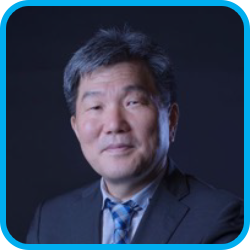
As the Chief Sector Officer, he leads the planning, implementation, and supervision of Sector Advisory Service Cluster’s vision, goals, and work plan.
The Office of the Cluster Head—which oversees the sector groups (SGs) of education, energy, finance, health, transport, urban development, and water—provides support on (i) administrative requirements of SGs, (ii) coordination among SGs and with Thematic Groups on cross-sector/thematic issues, (iii) maintaining consistency across SGs operations, (iv) financial resource mobilization for SGs, (v) external and internal relations, and (vi) global/regional knowledge platform.
He joined ADB in 2001 as an economist. Since then, he worked in both Bangladesh and Nepal Resident Missions as deputy country director, senior advisor to the managing director general, and director for Pacific Operations Division. Before joining SDCC, he led the establishment and became director of South Asia Human and Social Development Division, wherein he managed a portfolio of $7 billion. He was also chair of the Education Sector Group.
As a strategic and innovative leader, he has led high-level policy dialogue with developing countries and significantly contributed to ADB’s recent expansion in the social sector. Prior to joining ADB, he worked with Samsung and Korean National Pension, and taught economics at leading universities—Korea University and International Christian University, Japan.
Nationality and Education:
A national of the Republic of Korea, he holds a Doctorate and Master’s degrees in Economics from the University of Illinois, United States, and Bachelor’s degree in Economics from Korea University.
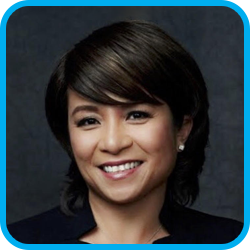
Liz Ortiguera is a senior executive with over 25 years of global experience and expertise in general management, marketing, business development, and partner network management. Liz is passionate about innovation, business transformation, and community building. Her career spans several industries—travel/lifestyle, technology, financial services, and pharmaceuticals. She is experienced in working in both corporate (American Express and Merck) and start-up environments (SaaS, e-commerce, and ed-tech). For 10 years, she was the general manager for Amex's Travel Partner Network, Asia-Pacific/ANZ managing partnerships with the top travel management companies, MICE (Meetings, Incentives, Conference and Exhibitions) companies, and leisure agencies in the region. She is able to adeptly work across cultures and business environments to catalyze opportunities and drive growth.
In her personal life, she has been a continual advocate for poverty eradication programs and education initiatives across the region. Liz is an alumna of Stanford University Graduate Business School, Columbia University Business School, New York University, and the Cooper Union in New York.

As executive director, Lauren Sorkin oversees global efforts to strengthen cities in the face of the complex and interconnected challenges. Leading a team of professionals in London, Mexico City, New York, and Singapore in collaboration with Chief Resilience Officers in over 40 countries, she drove the co-design process to launch the Resilient Cities Network as an independent city-led network organization.
Lauren serves as an advisor and spokesperson on urban resilience, women’s leadership, sustainable finance, climate risk, stakeholder engagement, and urbanization trends. She is on the advisory board of several sustainability-focused initiatives including Food Tank, the Singapore Sustainability Summit (S3), and Natural Capital.
Previously with the Asian Development Bank (ADB), Lauren led ADB’s first-ever climate change investment plan before moving to ADB’s Viet Nam Office to mainstream climate risks and opportunities in the country’s $7-billion portfolio. Before joining ADB, she worked with USAID to implement clean energy, climate change, and conservation projects in Asia, Africa, and South America. She has published work on biofuels, climate change, public speaking for social impact, infant mortality, and HIV/AIDS.
Lauren holds a BA in International Relations from Tufts University, and an MSc in Environment and Development from the London School of Economics.
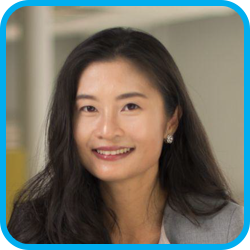
Caecilia Chu is the cofounder and CEO of YouTrip, a regional financial technology company dedicated to creating a next-generation digital banking experience in Asia.
Prior to founding YouTrip, Caecilia worked at Citigroup, overseeing growth investments in the consumer and technology sectors in Southeast Asia and the People’s Republic of China (PRC). Additionally, Caecilia worked at McKinsey, advising financial institutions across Asia on market entry, customer segmentation, and retail banking product strategies. Caecilia’s fintech experiences prior to YouTrip include positions at Lufax, PRC’s leading online wealth management platform, and QF Pay, a PRC-based global mobile payments company backed by Sequoia China.
Caecilia was named among the Top 50 CEOs in Financial Technology for 2021, Top 25 Women Leaders in Financial Technology of 2020, and the Top 10 Fintech Leaders at the Singapore FinTech Festival Global Fintech Awards 2021.
She has an MBA from Harvard Business School and a bachelor’s degree (summa cum laude) from The Wharton School of the University of Pennsylvania.

Ilaria is currently the group advisor on Tech & Social Impact for Grab, focusing on advancing diplomacy, thought leadership, and social impact reach for the Technology Decacorn startup. She is also the chairperson of the board of directors for Tech for Good Institute: a nonprofit think tank founded by Grab to encourage and enrich dialogue on social, economic, and policy trends accelerated by the digital economy.
Prior to assuming this role, she served as a corporate finance executive and helped drive Grab's historical Series H fundraise–the largest in the history of Southeast Asia. Ilaria was formerly an executive director at the Sales & Trading Division of Goldman Sachs New York.
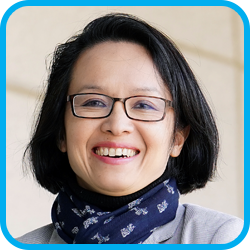
Anh Wartel has 20 years of experience in epidemiological studies, clinical research from phase I to phase IV studies, and CTD development. She earned her MD at the Paris XII Medical School, France and completed a post-graduate diploma in Public Health from the University of Liverpool, UK. She has extensive experience in the fields of epidemiological and clinical research within both academia and the pharmaceutical industry during her 15-year-long career with Sanofi Pasteur before joining the International Vaccine Institute (IVI) in 2018. After having started her research career as a co-investigator in drugs and therapeutic vaccine trials in HIV-infected patients at the French National Agency of Research on HIV/AIDS (ANRS) at Kremlin Bicetre University Hospital in Paris, she then joined Sanofi Pasteur in 2003. Her responsibilities grew over the course of 15 years to include epidemiology and clinical R&D activities (e.g., Japanese encephalitis, pneumococcal disease, dengue disease); medical affairs activities as the regional medical expert for enteric, endemic, and travelers vaccines (e.g., rabies, cholera, typhoid fever, hepatitis A, yellow-fever, dengue, Japanese encephalitis vaccines); and Country Medical Head for Vietnam and Cambodia. She joined IVI in September of 2018 as the Head of Clinical Development and Regulatory Department.
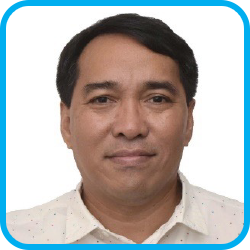
James Villafuerte is a senior economist at the Southeast Asia Regional Department (SERD). He conducts research on economics and regional cooperation issues in Southeast Asia, and also leads the SERD Policy Network of economists. He regularly writes economic outlook and risk assessment for Southeast Asia, and also examine its medium-term macroeconomic outlook, policy, and development issues—including COVID-19 economic recovery, global value chain participation, green economy, among others. His advisory and research expertise also cover economic modelling, financial integration, macroeconomic surveillance, and early warning systems. Prior to joining ADB, he was an economist at the World Bank and senior economist at the Department of Treasury and Finance in Victoria, Australia.

Lisa Oake is the former co-host of CNBC Asia’s top-rated morning program Squawk Box. She has 16 years of experience covering global economics, business and politics, and is a recipient of the CNBC special achievement award for journalistic excellence.
Lisa worked with CNBC Catalyst during the Asian Development Bank’s Southeast Asia Development Symposium in 2020 and 2021. She moderated virtual panels on the digital economy, green manufacturing and logistics at a conference in Chongqing.
She has conducted thousands of interviews with CEOs, central bank governors and heads of state, including the then President of Indonesia, Susilo Bambang Yudhoyono and the then Prime Minister of New Zealand, Helen Clark.

David Ingles is an anchor for Bloomberg Television and Bloomberg Radio. He co-anchors “Bloomberg Markets: China Open” weekdays and concurrently also oversees markets and charts content for the Asia Pacific.
Based in Hong Kong, China, Ingles provides coverage of the major macroeconomic stories and trends that shape markets and affect businesses in the Asia-Pacific region. He also travels across the region to cover key stories and summits including the Asia-Pacific Economic Cooperation, G20, and World Economic Forum where he interviewed some of the world’s top CEOs, political and economic leaders, tech entrepreneurs, and investors.
Prior to joining Bloomberg, Ingles was with CCTV News in Shanghai where he covered the Chinese financial markets and the country’s major economic reforms from the start of this decade. Before moving to the media industry, he spent several years in banking and financial services.
Ingles earned his bachelor’s degree in business from the Ateneo de Manila University, and an MBA degree in finance from the China Europe International Business School. He is fluent in English, Tagalog and Mandarin.
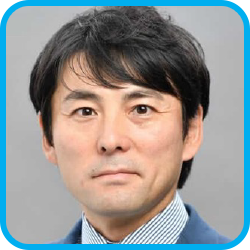
Akito Tanaka is a senior staff writer and chief business news correspondent at Nikkei Asia, covering the technology sector from Singapore. Tanaka has 20 years of reporting experience and has also been covering global companies in both Japan and the United States.
“I am honored to present the “COVID-19 Vaccine Development and Challenges Update” at the second day of ADB SEADS 2022: Sustainable Solutions for Southeast Asia’s Recovery. SEADS has been a remarkable platform for IVI in discussing the importance of equity in COVID-19 vaccine delivery and the growing dangers from the silent pandemic of antimicrobial-resistance.”
Dr. Anh Wartel
Deputy Director General for Clinical, Assessment, Regulatory, Evaluation (CARE), International Vaccine Institute (IVI)
"SEADS exceeded my expectations and the platform is phenomenal."
Christianne Nicole Giron
Graduating Student, Business Economics, PLM

